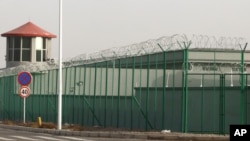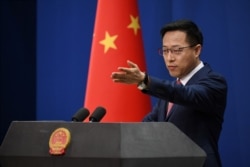In the latest pushback against foreign criticism of China’s human rights abuses, Beijing has endorsed a series of lawsuits against U.S.-based German researcher Adrian Zenz, whose research and conclusions have been central to claims of human rights abuses in Xinjiang.
Zenz, a senior fellow in China studies at the Victims of Communism Memorial Foundation in Washington, D.C., was one of the first scholars to reveal the construction of detention camps in Xinjiang and the mass detention of millions of Uyghur and Kazakh Muslims using satellite imagery, official documents of the Communist Party of China (CCP) and eyewitness accounts.
His work also revealed the forced sterilization executed by the CCP on Uyghur women in Xinjiang to reduce their community’s population.
The suits, filed by companies and individuals in Xinjiang according to state media, dispute a report Zenz wrote last year in which he said hundreds of thousands of ethnic minority laborers in Xinjiang were “being forced to pick cotton by hand.” The plaintiffs seek apologies and financial compensation from Zenz.
In the regular news briefing last Thursday, China’s Foreign Ministry spokesperson Zhao Lijian called Zenz’s reports “disinformation,” “with zero credibility,” which have caused “heavy losses” for “many companies and residents in Xinjiang.”
He said "their decision to seek legal redress against Zenz reflects a stronger awareness among the Chinese citizens to safeguard their rights through the law. We support this.”
This is the first time that such lawsuits have been filed in China against a foreign scholar who is studying China’s human rights issues. Reuters quoted Sarah Cook, the New York-based research director for China at the U.S. nonprofit Freedom House, as saying “it could set a worrisome precedent.”
Zenz told The Washington Post he believed the lawsuits were a sign that U.S. economic sanctions on Xinjiang were having a significant effect as it is the first time Beijing admitted “major economic losses” in the region.
He said Beijing was probably seeking to create a chilling effect on other researchers doing similar work, which shows “there is an element of desperation.”
Zenz told Bloomberg News that it would be a “welcome opportunity” for the world to examine the evidence of the abuses in Xinjiang.
On social media, some China scholars and netizens expressed resentment at the lawsuits, saying China's latest approach to fighting back against allegations of genocide in Xinjiang is "unacceptable."
In an online article in The China Collection March 9 discussing the legal aspects of the lawsuits, Donald Clarke, a professor who specializes in Chinese law at The George Washington University Law School, said, “There is little doubt that the plaintiffs will win in China. But what can they do with their victory? Nothing, unless they can enforce it in a jurisdiction where Zenz has assets. (Note that they don’t need to do anything about Zenz the person; it’s his money to which their Chinese court victory entitles them.)”
He also said, “Under the common law of enforcement of foreign judgments, as well as the statutes in almost all states, neither a treaty nor even reciprocity is required to enforce a foreign judgment. There is generally a requirement that the foreign judgment comport with due process, but the burden is on the defendant to show that it didn’t, not on the plaintiff to show that it did. In this case, presumably that would be relatively easy for Zenz to show.”
Rayhan Asat, an attorney based in Washington, D.C., who is from Xinjiang, said that with due process, U.S. courts have to provide Zenz with a proper legal process to defend himself and will not accept rulings from a court in Xinjiang, especially in such a politically influential case. "China is not ruled by law, you cannot even guarantee this due process. They will rule themselves as winners. But U.S. courts won’t recognize it,” Asat said.
Clarke said Zenz does not need to be seriously concerned about the lawsuits as long as he does not go to China.
Chen Jiangang, a human rights lawyer and former visiting scholar at American University Law School, told VOA, “China's domestic verdicts are written at will by the CCP. Such sentences would be a great harm to the world if other countries would recognize and enforce the sentences. Of course, I don’t believe this is possible. Civilized countries will certainly not conform to the CCP’s rules. It will be a joke, and it is just a harassment.”












